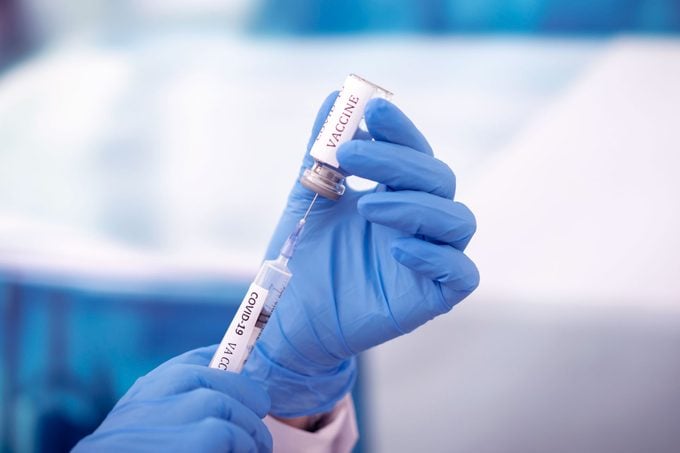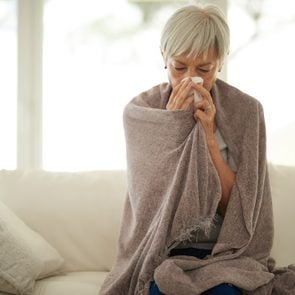5 Ways Delta Differs From “Regular” Covid and 3 Ways It’s the Same
Updated: Aug. 18, 2021
The Delta variant is now the dominant strain causing Covid-19 illness in the U.S. How does it differ from previous incarnations of the virus?
How the Delta variant is different
Covid-19 is upending our lives once again, thanks to the new, super-spreading Delta variant.
First identified in India in December of 2020, Delta now represents more than 83 percent of new U.S. cases, according to the Centers for Disease Control and Prevention (CDC).
It’s flying far and wide among unvaccinated people, pushing overall case rates up and straining hospitals, once again, to the brink.
The average positive rate for SARS-CoV-2, including the Delta variant, has steadily increased over the past six weeks, says Kim Gorode, a spokesperson at Quest Diagnostics, a major testing lab.
This is what fully vaccinated and unvaccinated people need to know about the dominant Delta variant.
Delta is more infectious
The most worrisome feature of the Delta variant is that it spreads much more easily than earlier versions.
One person with the original virus would infect 2.5 other people, on average.
Meanwhile, Delta is known to infect five to eight other people, says Ravina Kullar, PharmD, a spokesperson for the Infectious Diseases Society of America (IDSA) who is also adjunct faculty at UCLA’s David Geffen School of Medicine.
According to internal CDC documents reported by The New York Times, the variant is as contagious as chickenpox and more transmissible than MERS, SARS, Ebola, the common cold, the annual flu virus, and smallpox.
It is not as efficient at mutating as HIV, the virus that causes AIDS.

Delta will spur more “breakthrough” infections
“If you’re vaccinated, you’re still much less likely to get very sick, but you’re more likely [to get infected] than with the previous version,” says Aaron Glatt, MD, a spokesperson for the Infectious Diseases Society of America and chief of infectious diseases at Mount Sinai South Nassau in New York.
That’s simply the result of higher numbers overall.
Infections in vaccinated people are breakthrough infections.
Currently, breakthrough infections represent only about 0.01 percent of all Covid-19 infections.
That proportion isn’t likely to change, but as overall infections go up, so will spillover into vaccinated people.
The vaccines can still protect you
The available data are preliminary but, so far, it looks like two doses of the Pfizer mRNA vaccine are about 88 percent effective in warding off Covid-19 symptoms.
That’s down from the 95 percent figure cited for the earlier variant, but still shockingly high.
The Moderna vaccine is also highly effective against Delta, possibly higher than Pfizer, says John Zaia, MD, director of City of Hope’s Center for Gene Therapy in Duarte, California.
The one-shot Johnson & Johnson vaccine is less effective against Delta but, Dr. Zaia points out, still very good at preventing hospitalizations and death, as are Pfizer and Moderna, also.
Everyone will probably need boosters one day
On August 12, the Food and Drug Administration granted an emergency use authorization for a third booster shot of Pfizer and Moderna for people with weakened immune systems, including organ transplant recipients.
Immunocompromised people don’t respond as well to vaccines and are already at a heightened risk of severe illness and death from Covid-19.
The Delta variant likely played a major role in the FDA approval, says LaTasha Perkins, MD, a family physician in Washington, D.C.
“The booster may offer immunocompromised people the same level of protection as a non-compromised immune system has,” she says.
There may be more help for this group coming.
Dr. Zaia and his colleagues are currently enrolling for a Phase 2 trial of a Covid-19 vaccine. It is specifically for people with less robust immune systems.
“The first vaccine that comes along is not the last one,” says Dr. Zaia, who believes we will all need boosters at some point. “As a virus becomes endemic, you have annual shots.”
Delta probably doesn’t make you sicker
Some studies have suggested that Delta actually makes you sicker with more patients hospitalized than the original virus, but others contradict this idea.
“I don’t believe it’s causing more serious illness,” says Dr. Zaia. “We see more hospitalizations and deaths because there are more cases.”
Delta seems to produce the same symptoms as earlier versions of the virus, that is to say, fever and chills, cough, difficulty breathing, loss of taste or smell, headache, congestion.
There are some early hints that cough and loss of smell may be less common with Delta.
As with previous mutations, vaccinated people usually have much milder symptoms, and are less likely to go to the hospital or die due to the infection.
Delta hits children hard
A British study found that positive Covid-19 tests in children ages five to 12 seemed to be driving much of the growth of the Delta variant. (Note that this research article is a preprint and has not been peer-reviewed, yet.)
This is probably a factor in how fast the virus spreads, rather than any specific mutation targeting children, says Dr. Zaia.
There’s also no vaccine approved for children. Overall, notes Dr. Zaia, “Most of people in any age group who are in the hospital or dying are unvaccinated.”

Vaccinated people can still transmit Delta
In fact, they may be more infectious given that viral loads from Delta may be as much as 1000 times higher than previous strains, according to one study in the journal Genomic Epidemiology.
“Delta has increased the amount of virus that appears in your throat and nose,” says Dr. Zaia. That’s both in vaccinated and unvaccinated folks.
The slightly better news is that vaccinated people may not be infectious for as long as someone not vaccinated.
(Find out why some people are more likely to spread Covid.)
Delta isn’t the first mutation, and it won’t be the last
As an RNA virus, SARS-Cov-2 mutates almost by definition. Most of the mutations have no additional impact on human health compared to the first strain of the virus that swept the globe, but some do.
One was the Alpha variant, first identified in the U.K. “I would say that’s put to shame by the Delta variant,” says Dr. Kullar.
Beta (South Africa) and Gamma (Brazil) are also “variants of concern.” The emerging Lambda version, first noticed in Peru, is a “variant of interest.”
Getting more people vaccinated is the only thing that will stop the spread of new, potentially more deadly, and more infectious variants.
“If anything, the Delta variant tells us that everyone needs to get vaccinated,” says Dr. Kulular.
“The more people who are vaccinated, the closer we are going to get to herd immunity.” (Herd immunity is when there are enough people vaccinated in a community to break the chain of infections.)
Masks still work
The CDC recently updated its guidance to recommend that even vaccinated people wear masks in public indoor places in areas of substantial or high transmission.
“The importance of masks, physically distancing, not having mass gatherings indoors or outdoors needs to be reemphasized,” says Dr. Kullar.
In fact, masks may be more important than ever, no matter your vaccination status.
If you haven’t been vaccinated and are able to do so, go do it. You may have heard some ludicrous Covid-19 vaccine conspiracy theories, but you can comfortably dismiss them. (And no, the Covid-19 vaccines do not cause infertility.)
If you are vaccinated, pay attention to any boosters you may need and mask up when you’re in high-risk situations.
















